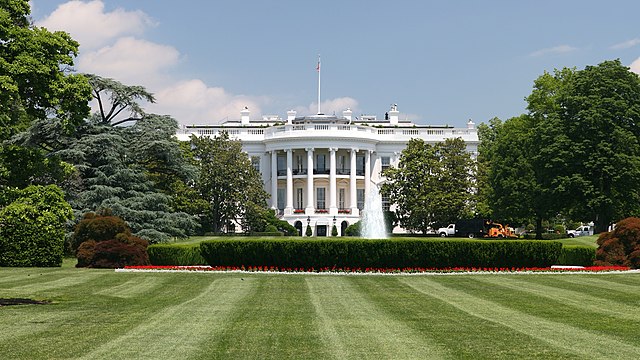White House lawn by Daniel Schwen
Increasingly aggressive rhetoric from America’s leaders has led to the alienation of many Americans from their democratic system of government, leading many to embrace violence as an alternative, with 12% of Democrats and 28% of Republicans believing that violence may be necessary to resolve the country’s issues. If America’s democratic traditions are to be maintained, her leaders must reign in their excessive demonisation of each other and return to a more civil politics.
Explosive rhetoric has long been a feature of America’s raucous politics, but in recent years, we have seen an escalation of alarmist language, with America’s leaders pillorying their opponents as“extremists”, “fascists” and “the enemy within.” Worse yet, some have taken to openly encouraging violent behaviour within their ranks. While campaigning in 2016, President Trump called on his supporters to “knock the crap out of” hecklers attending his events, and later praised Congressman Greg Gianforte for assaulting a reporter, saying “anybody who can do a body slam, he’s my guy.”
The Democrats have hardly behaved any better, often trying to match Trump’s intense style with childish fantasies about President Biden “taking Trump behind the gym” or worse, with some leading Democrats calling for supporters to harass their opponents in public, and others threatening supreme court justices over rulings they disagreed with, with Chuck Schumer warning Brett Kavanaugh after the overturning of Roe V. Wade, “You have released the whirlwind and you will pay the price. You won’t know what hit you if you go forward.”
Another deeply alarming trend is that many of America’s politicians are increasingly inclined to deny election results when defeated, most notably in 2020, when Donald Trump refused to accept defeat, resulting in the January 6th fiasco and threatening the peaceful transfer of power. However, a number of Democrats have also engaged in brazen denials of their own losses and refused to accept the legitimacy of President Trump’s 2016 victory.
This escalation is a far cry from the days of mutual charity between Obama and John McCain, and has contributed to an atmosphere of deep unrest in America’s citizenry. According to research from the Polarization Research Lab, when political leaders become more negative, citizens become more negative in turn. Their research has found a link between the increasing focus of America’s leaders on attacking the “other side” (rather than discussing policy/legislation/etc.) and levels of polarisation, increasing to the point where many are now willing to forgo democratic norms in favour of violence. This is particularly alarming, given that further research has shown that democracies characterised by higher levels of affective partisan political polarisation are 34% more likely to experience frequent political violence.
The results of this polarisation in America have been shocking, with violent street fighting, riots and even attempts to overturn election results increasingly becoming features of American political life. Worst of all, we have seen multiple attempts to kill politicians, from baseball practice shootings to explosives in the mail. Even President Trump himself has not been safe, facing one assassination attempt at a rally in Butler Pennsylvania which, although he thankfully survived, saw one of his supporters killed and others injured. A mere two months later, President Trump was subject to another such attack, this time at his golf course in West Palm Beach.
Political violence is no longer an aberration in America but has become a fact of life. How then are politicians to respond? President Biden was correct when he said that “there is no place in America for this” violence, and the time has come for both parties to unite against this scourge. Both parties have played a role in creating the current climate, but now they must work together to reform their behaviour and reduce tensions. With two-thirds of Americans fearing there could be violence following this year’s election, it is absolutely crucial that both the Republicans and Democrats turn away from the toxic precedent of the last eight years. Thankfully, Vice President Harris provided a fine example of this principle, accepting defeat in a gracious concession speech to her supporters. President Biden followed suit by inviting President-elect Trump to meet at the White House and pledging an orderly transition. Post-election, America’s political class on both sides of the aisle must make a conscious effort to moderate their rhetoric towards each other, remembering that whatever their disagreements, they are all Americans. A final olive branch for President Trump to offer would be to finally admit that he lost the last election, particularly given that his victory this year has reignited claims of 2020 election fraud amongst certain elements of his base. For the sake of national unity, President Trump would do well to quash such ideas quickly unless he can offer some evidence for them.
While some Americans may find themselves increasingly attracted to the use of violence for political ends, it is clear that the vast majority of Americans want nothing to do with such practices. It is high time for both parties to appeal to this sensible majority and refrain from the inflammatory rhetoric that has contributed to the radicalisation of so many. America’s leaders must put aside the demonisation and calumny, and instead strive to make the phrase ‘my fellow Americans’ great again.
Press Contact
Charles Cooper, Co-Director,Public Relations Lead of the International Association for Democracy (IAD)
Mail: press@iad.ngo


